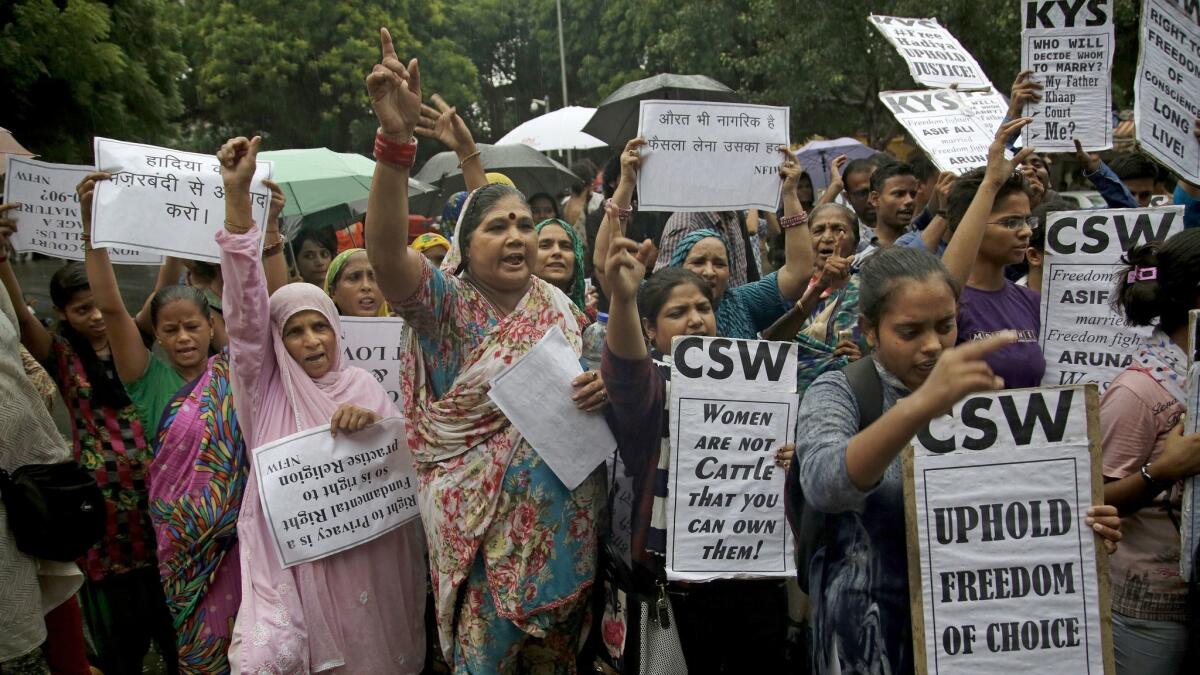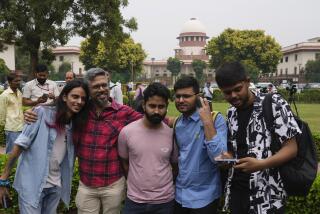Indian court upholds marriage amid claims of Muslims trying to forcibly convert Hindu women

- Share via
Reporting from Mumbai, India — India’s highest court Thursday upheld the marriage of a Muslim man and a woman who converted to Islam against the wishes of her Hindu parents in a case that fueled claims that Muslims were forcibly converting Hindu women.
The case of 24-year-old Hadiya, who uses one name, and her husband gained national attention after a court in the southern state of Kerala nullified their marriage last year and the Supreme Court asked India’s federal investigative agency to examine allegations of forced religious conversions — a practice dubbed “love jihad.”
No evidence has publicly emerged to support the claim that Muslims, a minority in overwhelmingly Hindu India, have launched an organized effort to convert Hindu women through marriage. But the allegations have spread through a country led by Hindu nationalist Prime Minister Narendra Modi.
Hadiya, who was born Akhila Ashokan in the southern state of Kerala, testified before the Supreme Court that she married Shefin Jahan in 2016 out of love after they met on a matrimonial website.
Her father had challenged the marriage in the state court in Kerala, alleging that Muslim organizations planned to take her to Syria, where she would be used “as a sex slave or human bomb.”
Kerala, a lush coastal state of 33 million people, half of whom practice Christianity or Islam, has come under scrutiny from Indian investigators as a potential source of Islamic State sympathizers. Indian police have said as many as 100 people from Kerala have joined or sympathized with Islamic State, although a study by Brookings India, a think tank, last year put the figure at 37.
The Kerala state court ruled last May that a woman Hadiya’s age was “weak and vulnerable” and that marriage, “being the most important decision in her life, can be taken only with the active involvement of her parents.” The court annulled the union, sending Hadiya back to live with her parents.
The state court ruling galvanized human rights advocates in India, particularly after the Supreme Court — hearing an appeal by Jahan — asked the National Investigation Agency, the country’s main anti-terrorism law enforcement organization, to look into alleged cases of forced conversions.
The agency has not publicly released its findings, and the Supreme Court said that its investigation could continue so long as it did not delve into Hadiya’s marriage.
Hadiya was “at liberty to pursue her future endeavors according to [the] law,” the high court said in its judgment Thursday.
Hadiya did not immediately comment publicly. Speaking by phone, Jahan, who has not been charged in the case, said he was relieved.
“Our prayers are heard,” he said. “We are very happy.”
Hadiya’s parents did not answer phone calls.
Parth M.N. is a special correspondent.
Shashank Bengali is South Asia correspondent for The Times. Follow him on Twitter at @SBengali
More to Read
Sign up for Essential California
The most important California stories and recommendations in your inbox every morning.
You may occasionally receive promotional content from the Los Angeles Times.











